#science fiction short story
Text
Farewell to the Master - the Harry Bates short story that inspired "The Day the Earth Stood Still"
first published in the October 1940 issue of Astounding Science Fiction

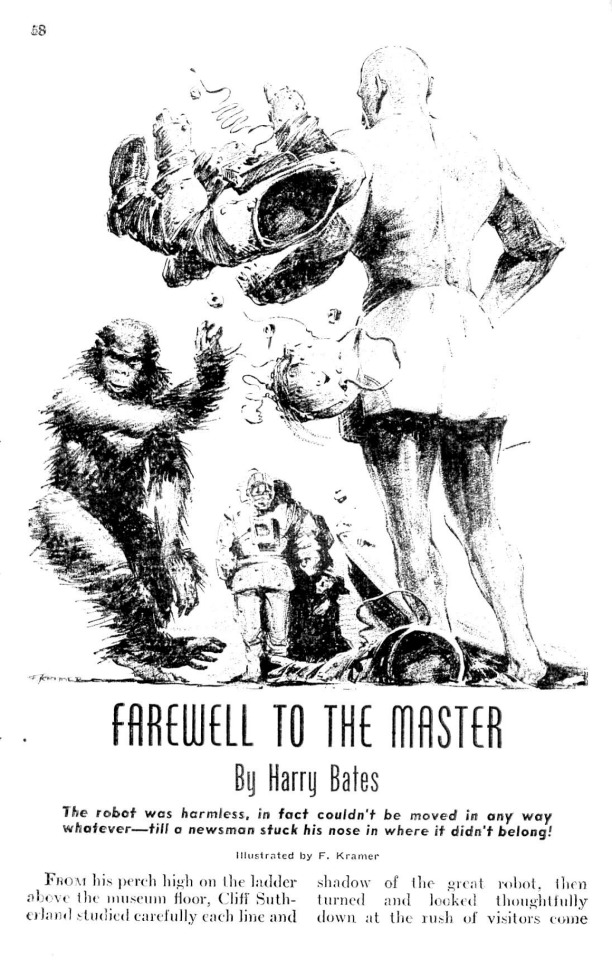
1 note
·
View note
Text
Seamus the Red - short story
“Place been combed through. We got more chance findin a ‘tractive mole on a witch’s nose than we find a thing worth more a bucket o’ toenails thar,” Law said in a deep drawl. He looked away from the display, at me. “It do bring mind a interestin story ‘bout t’is relic hunter who up and snapped ‘bout thirty years ago. Processed ‘bout half goddamn soil there he did.”
Law leaned back and crossed…

View On WordPress
#book#expedition#fiction#Mickey Mouse#outer space#pirate#pirates#popcorn#radiation#sci-fi#sci-fi short story#science fiction#science fiction short story#scifi#scifi short story#Seamus the Red#search#short story#space#spaceship#treasure hunt#whiskey
1 note
·
View note
Video
youtube
The Street That Wasn't There By Clifford D Simak and Carl Jacobi (Sleep ...
I have a special treat for Friday, this is an amazing story that is fun to ponder that is relevant as a discussion within the reality revolution.
The story of a suddenly altering and vanishing Earth seen through the eyes of a recluse with a deep knowledge of metaphysics and reality creation.
Stories have the ability to teach us about concepts and ideas that are beyond simple explanation. Jesus used the parable to teach lessons. This story offers food for thought and contemplates the general nature of co creation.
Each of us create reality with our thoughts and mind. But what are the dynamics of reality creation when it comes to groups. The world we see is the world we are together co creating.
But what if there is not enough people to co-create this planet and another entity can come along and become the predominant reality creator?
This concept is explored in this fun and entertaining golden age science fiction short story by Clifford Simak and Carl Jacobi.
The story of a suddenly altering and vanishing Earth seen through the eyes of a recluse with a deep knowledge of metaphysics and reality creation.
You can treat this as a sleep story or just enjoy it like a movie. I am getting better at reading better so give me another chance.
Let me tell you a story.
0 notes
Text
Fallen Princess (Original Short Story)
My world is dark. Actually, dark is the wrong word. It's shadows. It's been a few cycles, and I've become attuned in that time, so it doesn't seem new anymore. The terrain we weaved on was even and packed, easy for me to follow even without Adric holding my hand. But he was still so protective. As we walked, the shadows of each building were not really distinct enough for me to differentiate with what little sight I still possessed, but there was a temperature difference on my hand.
I heard the bar before I smelled it. The racket of the saloon held its cadence and comforted me.
But once inside, I felt at home. Adric led me to a table, his arm jerking each way he turned during his security check. Old habits die hard.
“What’s the occasion?” I asked. His rough hand slid over the folds of my shirt, catching the fabric.
In my ear, his voice low, Adric told me, "My job finished. Thought a proper meal was in order." He pulled down the hood of my cloak, reminiscent of days long ago when many hands would prepare my clothing and hair. Back then, most of my day had been scheduled, and I was hardly allowed to do anything with my own hands. Now I did as much as possible, and my soft palms and fingers were as rough as Adric's.
Before, Adric was there with me too, but it was the opposite of now. If I'm being truthful, I far prefer our relationship now. He'd been so cold and distant in cycles past. Though, he could not hide his tenderness from me.
"You're fussing," I sing and find his arm. His rough hand jumps away, then cups my cheek.
Check out the entire story on my blog.
#short story#original fiction#original short story#its totally based off of a fanfic I never wrote#original writing#short reads#fiction#science fiction short story#my writing#writing
1 note
·
View note
Text
People don't realize how liminal it is to be a time traveler. How you don't ever really feel like you're in the time you are. Even when you're in your own time, everything is off, your coat was something you bought in interwar France, the book you're reading on the train is from a bookstore you had to visit in Victorian London, even your necklace was given to you by a Neolithic shaman, from a culture the rest of the world can never know. You find yourself acting strange even when in the present, much less in the past you have to work in.
You remember meeting a eunuch in 10th century China, and having him be one of the only people smart and observant enough to realize you were from a diffrent time. You could talk honestly with him, though still you couldn't reveal too much about your time. And it was still so strange hearing him talk casually about work and mention plotting assassinations. You're not allowed to but you still visit him sometimes.
You remember that the few times you were allowed to tell someone everything it was tragic. You knew a young woman who lived in Pompeii, who you had gotten close to, a few days before she would inevitably die. On your last day there you looked into her eyes, knowing soon they'd be stone and ash, that the beauty of her hair would be washed away by burning magma. And you hugged her, and told her that you wanted her to be safe, and told her she was wonderful and that you wanted her to be comfortable and happy. And you let her tongue know the joy of 21st century chocolate, and her eyes see the beauty of animation, knowing she deserved to have those joys, knowing it wouldn't matter soon. And you hugged her the last time, and told her she deserved happiness. And when you left without taking her it was like you were killing her yourself.
You want to take home everyone you're attached to. There's a college student you befriended in eighteen fifties Boston. And you can't help but see him try to solve problems you know humanity is centuries away from solving. And you just want to tell him. And it's not just that, the way he talked about the books and plays he likes, his sense of humor. There's so many people you want him to meet.
You feel the same way about a young woman you met on a viking age longship. She tells stories to her fellow warriors and traders, stories that will never fully get written down, stories that she tells so uniquely and so well. She has so many great ideas. You want so dearly to take her to somewhere she can share her stories, or where she can take classes with other writers, where she can be somewhere safe instead of being out at sea. She'll talk about wanting to be able to do something, or meet people, and you know you're so close to being able to take her, but you never can, unless she accidently finds out way too much then you can't.
You remember the longship that you met that young storyteller on. You were there before, two years ago for you, ten years later for the people on it. The young woman who told you stories wasn't there ten years later, you had been told why then but you only realize now, her uncle, who ran the ship, had been one of the first people to convert to Christianity in his nation. He killed her, either for not converting or for sleeping with women, you're not sure, but he killed her, and bragged about it when you met him ten years later.
You talk to the storyteller on the longship, ask her about the myths you're there to ask her about, the myths that she loves to tell. You look into her eyes knowing it's probably less then a year until her uncle takes her life. You ask her if you think that those who die of murder go to Valhalla. She tells you she hopes not, she doesn't see Valhalla as a gift but as a duty, she hopes for herself to go to Hel, where she wouldn't have to fight anymore. You slip and admit you're talking about her, telling her that you hope that's where she goes when she's killed. You hope to yourself you'll be forced to take her to the twenty first century, you're tempted even to make it worse, you want to have ruined her enough to be able to save her.
#196#my thougts#worldbuilding#writing#my worldbuilding#my writing#urban fantasy#ancient history#history#short fiction#short story#original fiction#flash fiction#viking#viking age#norse mythology#ancient rome#pompeii#science fantasy#science fiction#sci fi#scifi#queer#queer history
278 notes
·
View notes
Text











Do You Love the Colour of the Sky? (Or: This Must be the Place)
(I apologize for the resolution in advance. Still troubleshooting.)
#spec fic#speculative fiction#heritage post#do you love the color of the sky#art#ocs#original story#short story#arg#original arg#Tumblr arg#prose#scifi#science fiction#meme#shitposts#shitposting#hellsite#poets on tumblr#poetry#god let this get notes I've had the idea for so long and I need someone to appreciate it
2K notes
·
View notes
Text
It’s back!
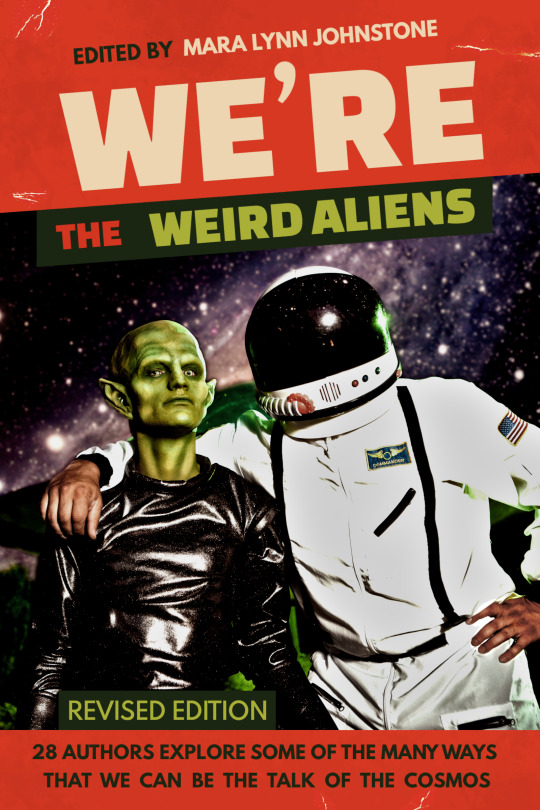
If you missed it the first time around, the “human are weird” anthology is back for a second printing. (There’s even a new story included: “Black Box” by Dara Brophy.)
Here’s the blurb:
In science fiction, humans are usually boring compared to other races: small, weak, with no claws or tentacles, and no special abilities to speak of. But what if we were the impressive ones, the unsettling ones, the ones talked about by all the other aliens? What if we're weird?
If you’d like a collection of excellent stories about humans inspiring awe, fear, and utter confusion, it’s available everywhere books are sold!
#humans are weird#humans are space orcs#haso#hfy#eiad#science fiction#short stories#my writing#other people's writing#Did you know? The story I contributed is in the Token Human timeline#though it takes place after the short stories I've been writing lately#and shortly before the novel A Swift Kick to the Thorax#I hadn't even thought up the current series of stories when I wrote this one#so Robin is working on a different ship#shortly before she gets a job on an alien planet#though she doesn't know that yet#anyways it's fun#and so are all the other stories in here#there are some GREAT ideas#I recommend#The Token Human#and more
184 notes
·
View notes
Text
An Overview Over the Solarpunk Anthologies
I thought, where I am already here, trying to get everyone to engage with Solarpunk as more than just an aesthetic and pretty flowers, I should give a quick overview over the Solarpunk antholigies, that have been released so far.
Note that so far most releases within the genre are in fact short stories. Though if anyone is interested, I can make a list of the novels I am aware of!
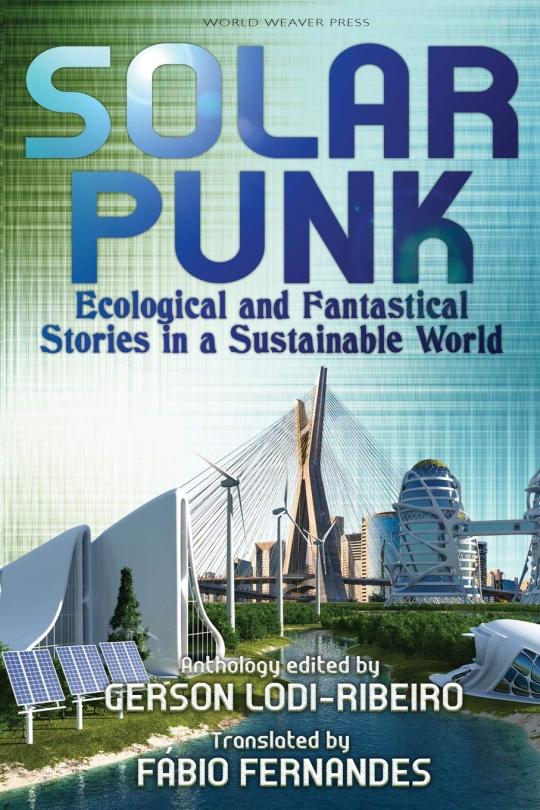
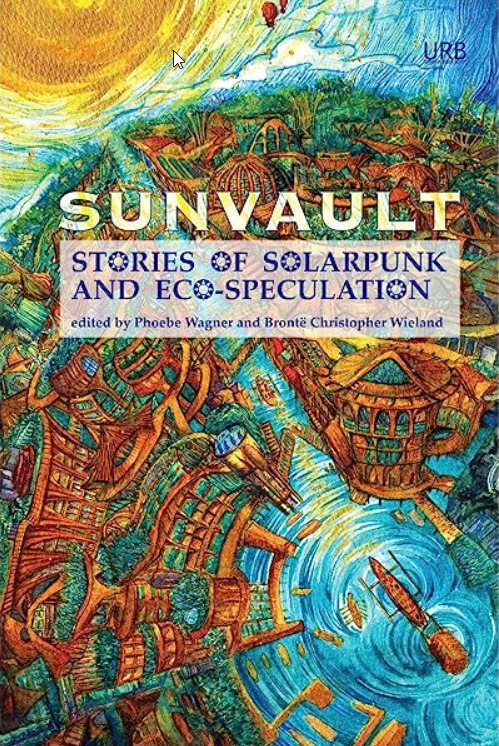
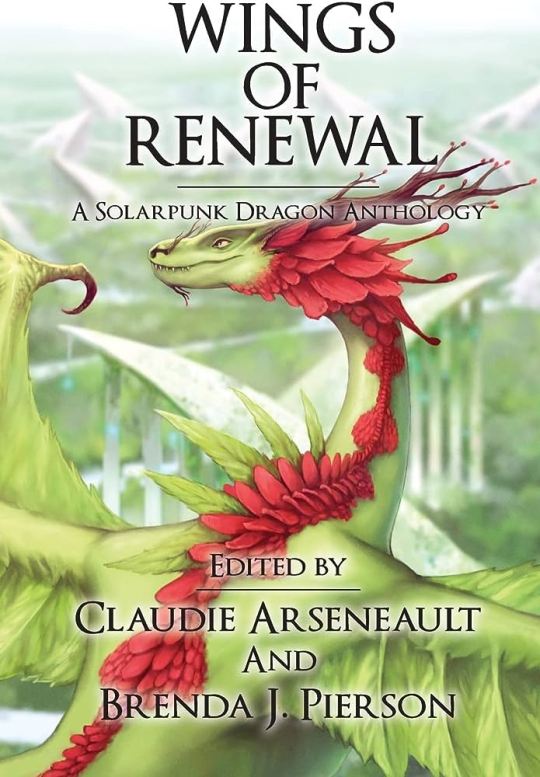
Solarpunk: Ecological and Fantastical Stories in a Sustainable World is pretty much how the genre got its start. The book was originally released in Brazil and only recently had been translated into the English language. It only covers a few stories, but those are a bit longer than your average short story to make up for it.
Sunvault: Stories of Solarpunk and Eco-Speculation has been quoted by many writers in the genre to have been a massive inspiration to them. The stories are very diverse and cover lots of ground.
Wings of Renewal: A Solarpunk Dragon Anthology is probably the weirdest out of this bunch. While all of the other anthologies mostly focus on either SciFi settings or stories set in the here and now, Wings of Renewal mixes Solarpunk with Fantasy elements. At times those stories are SciFi, too, at times they are really mostly fantastical.
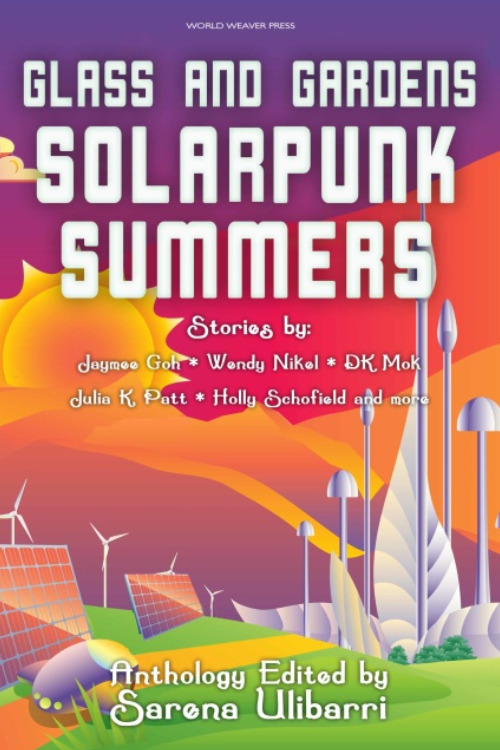
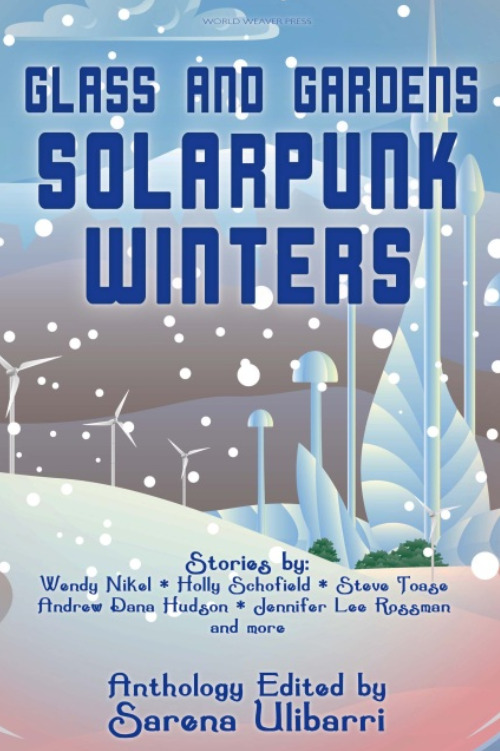
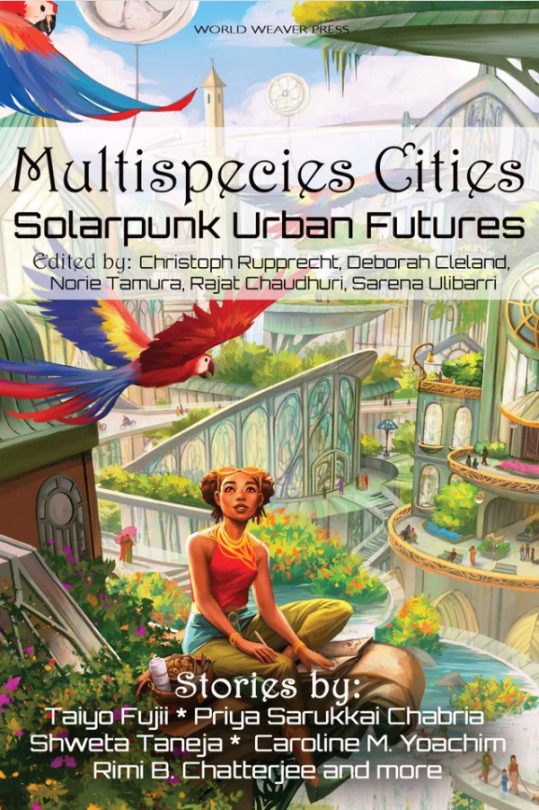
Glass and Gardens: Solarpunk Summers explores a wide variety of Solarpunk settings, some hopeful, some less optimistic. It is mostly set in warm and hot scenarios, though those can also vary quite a bit.
Glass and Gardens: Solarpunk Winters then went ahead as a "sequel" of sorts to explore the concept of Solarpunk in colder climates.
Multispecies Cities: Solarpunk Urban Futures has probably to be my favorite one from the anthologies edited by Sarena Udaberri. It explores how humans and animals can live together in Urban settings. And once again, the stories vary from those set in a more futuristic and a more present setting a lot.
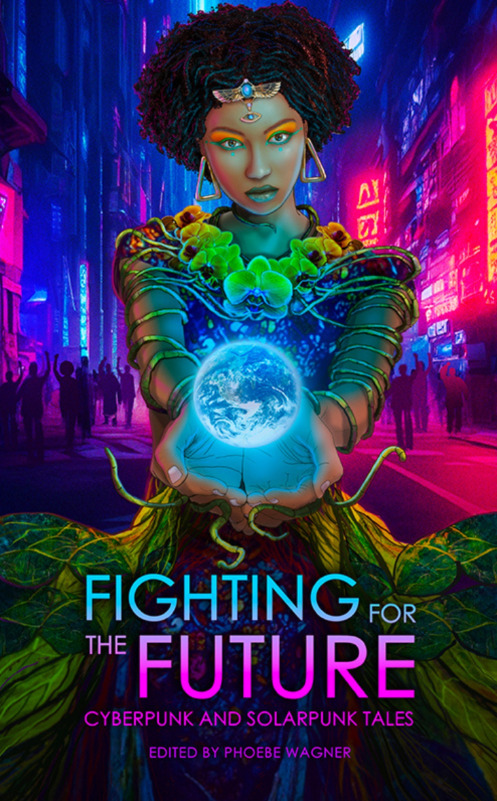
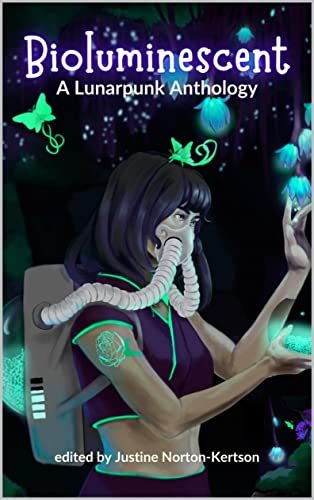
Fighting for the Future is the most recent of those anthologies, as it has only released last month. (And yes, this also means: I have not yet read it at all.) It features stories of Cyberpunk and Solarpunk futures - as well as stories where both intertwine!
Bioluminescent: A Lunarpunk Anthology is exactly what it says on the cover. An anthology featuring Lunarpunk stories. So Solarpunk with a bit more mysticism to go with it. And as this also only has released earlier this year I admittedly also have not gotten around to reading it yet.
This does remind me though: Would anyone be interested in me writing mini reviews to the stories in those anthologies?
#solarpunk#lunarpunk#solarpunk fiction#anthology#short stories#overview#scifi#clifi#science fiction#climate fiction
551 notes
·
View notes
Text
The Ones Who Found The City
Ursula K. LeGuin's "The Ones Who Walk Away from Omelas" is a classic short story, and obviously I knew of it, but I'd never actually read it until recently. Well, I finally got around to it, and as many timeless classics do, it got stuck in my brain. This story is my - response? homage? sequel? pale imitation? - to it. I suggest you go and read "The Ones Who Walk Away from Omelas" if you haven't. Not because it's actually required reading for this story - I think it stands on its own more or less okay - but because it is a classic for a reason.
---
Initially, no one is quite certain of what they’ve found when the Animus breaches the next manifold layer. This is in and of itself expected, of course. Exploring psychspace is by its very nature an unpredictable venture. Each of the various infinite layers is unique and bizarre in its own way, reflecting the archetypal underpinnings of an entire species present, past, or future across an infinitude of possible realities. The crew of the Animus, therefore, has seen things so utterly alien and inexplicable that only the rigors of their training and the care put into their psychic warding saved them from insanity.
It is somewhat disappointing, then, to find that this sub-domain is just a city. Definitely not Terranic, certainly not, but still following the Terranic modality, with no more than a seven-degree quantum drift.
“Towers,” Thromby says into the recorder as they sit at their post at the nose of the Animus’s command center. “Following the standard skyscrape pattern. Unclear if they’re domiciles or business centers or both. Coastal city, bay appears to be oceanic rather than lake. Pleasing blend of urbanization with natural setting.” They glance at Vigil. “Anything on the lifescope?”
Vigil shakes his head. “Nothing. It’s empty. Totally empty.”
“That’s odd,” Katrina speaks up from the helm. “The city doesn’t show signs of decay or reclamation by nature.”
“Entropy may not work in the usual way in this sub-domain,” Teasha reminds her. “The city itself could be the natural growth, reclaiming the artificial countryside. We’ve seen things like that before.”
Thromby feels Katrina’s unconscious bristling at the subtle reminder that she is the newest member of the crew and thus less experienced in the vagaries of psychspace than everyone else. Next to Vigil, who is only nineteen, she is also the youngest. “I would expect,” Katrina says, her voice cool, “that in a sub-domain so obviously based on human archetypes, entropy and nature-versus-civilization tropes would function more or less as usual.”
“I’m certain you would,” Teasha replies, her voice equally cool. “When you’ve been at this as long as me and Thromby, you’ll learn better.”
“Enough of that,” Thromby says before Katrina can reply. They love Teasha, but she tends to be too harsh on new crewmembers. A defense mechanism, they know, to insulate her from the all-too-common pain of losing them. But Katrina has too much to prove. The clash is natural and to be expected, and even useful at times, but now is not one of them. “Vigil, get me readings on atmosphere, microbiome, and psychic radiation, if any. Katrina, pick a spot on the coast and bring us down there. I want to see if the ocean is actually an ocean or a liminality representation. Teasha, get the Animus tuning to this sub-domain’s resonance frequency. I don’t want any dissociation issues.”
The orders are mostly unnecessary, since everyone already knows what they’re about, but they serve their intended purpose, which is to re-focus everyone on the task at hand and redirect their nervous energies, particularly Katrina’s. Thromby still isn’t sure she’s going to make the cut after this expedition is over, but there’s potential there. They would be foolish to ignore someone with Katrina’s strength of identity grounding.
There are plenty of sub-domains out there where it’s useful to be entirely certain of who you are, and not everyone can be.
---
The first day’s worth of exploration yields more questions than answers, which is normal and expected. Thromby is indeed certain that Katrina’s initial assumption that this is a human-archetypal sub-domain is correct. Human atmosphere, human shadow- and ontological concepts, Terranic fish in the very-real ocean. But the iconography is sparse and mostly nonsensical. It’s clear that the city was able to actually function as a city, but it feels purposeful, designed, in a way that actual cities outside psychspace rarely do.
“It’s a metaphor,” Vigil says as they sit around a campfire on the beach after the first day.
“Well, obviously,” Katrina agrees, and Vigil lights up – both visibly and psychically – at her concordance. Thromby knows Vigil has been nursing burgeoning feelings for Katrina since she joined them, and has so far seen no need to make anything of it. “But a metaphor for what?”
“We don’t have enough data,” Vigil replies. “But I’m certain of it. We just need to keep exploring.”
Thromby takes a bite of the fish they’ve been roasting over the fire. It’s a pleasant change of pace to be able to eat something real, instead of the platonic nourishment suggestions dispensed by the Animus. “Agreed. I’m curious to see what the point of this place was. We have five more days before we have to resurface and the expedition has been quite successful already. I think we can spare the time. Teasha?”
Taking a bite of her own fish, Teasha purses her lips as she chews. “I concur, but I’m uneasy.”
Teasha is their psychometry specialist, so this makes all of them sit up a little straighter. “Are we in danger?” Katrina asks.
“Of course we’re in danger, we’re in psychspace. But in this particular sub-domain? Metaphorical danger, as Vigil says. Ideological or memetic patterning rather than physical.”
Thromby nods. “I suspected that might be the axis of it, here. We will need to split up to cover the necessary ground in the time we have left, so everyone stays in contact while exploring. Mechanical and psychic. No exceptions.”
None of them are particularly happy with this pronouncement, but they see the wisdom of it. It’s distracting and somewhat draining to keep a four-way psychic connection going, especially over distance, but their implanted transceivers sometimes don’t function properly, depending on the sub-domain. Electromagnetism and causality both seem to be standard here, but such things have been known to change in an instant depending on whether the sub-domain is actively malicious or not.
Thromby doesn’t feel any such malice here, though. That doesn’t mean it isn’t present; such things are often quite good at hiding themselves. But they’ve been exploring psychspace for seventy-eight years subjective. They’ve learned to trust their instincts.
---
Two more days of exploration are frustratingly unrevealing. The city is the size of a proper metropolis, and they know it will be impossible to actually explore any significant percentage of it in only a few days, but Thromby is still irritated by their lack of progress. They find evidence of cultural signifiers, rituals, and traditions, but again, the iconography is vague and appears opaque to standard Jungian-Jingweian analysis.
Teasha spends the two days on a different investigative track than the rest of them. “Psychometrically speaking the city is remarkably healthy,” she said on the morning of their second day. “Most locations, metaphorical or otherwise, bear the echoes of trauma or strife, but this place seems to have been almost entirely peaceful. Totally voluntary anarcho-communism or ordnung-socialism, perhaps, without the usual markers of systemic violence inherent to capitalistic or fascistic systems. But there’s a thread somewhere that I keep detecting the edges of.”
“A thread of what?” Thromby asked.
“Pain, of course.”
It is on the evening of their third day in the city that Teasha calls them to her. She uses their transceiver link rather than a psychic summons. “To avoid contamination,” she explains. “I’ve found the source of the thread. Double your usual wardings and enter seclusive patterning before you come inside.”
Thromby does so, of course, though they dislike cutting themselves off from their extrasensory perception. It feels like trying to see with only one eye. When they arrive at Teasha’s location, however, they immediately understand why she insisted on it. The possibility of psychic contamination here is very high.
“What is this?” Katrina asks, holding her nose in disgust.
“The point of the metaphor, of course,” Teasha replies. She indicates the filthy cellar in which they’ve found themselves, the only part of the city so far that has seemed actively decrepit. “I guarantee you that even if we spent the rest of our lives exploring this city we would find only this one place showing any signs of entropy.”
The cellar stinks of excrement, a combination of ammonia and fetid shit, despite the physical processes creating such smells having terminated long ago. The floor is dirt. There are no windows. In one corner there are two mops, their heads stiff with drying waste, and a bucket, the metal bands around its circumference orange with rust.
“They concentrated all of the city’s entropy into a single space?” Vigil asks.
“Not entropy,” Teasha tells him. “Cruelty.”
Katrina gapes, her hand falling away from her nose for a moment. “Come again?”
“Something lived here,” Teasha explains to her. “Or, more precisely, was forced to live here. It functioned as a psychic magnet, of sorts. The functioning of the city relied entirely upon its imprisonment and use as a scapegoat.”
“What was it?” Vigil asks.
“One of the innocence-sacrifice archetypes. An animal or a child. I suspect a child; an animal can feel pain and misery, certainly, but it doesn’t conceive of injustice in the same way a child does.”
Thromby feels their stomach turn a little. “Ah. I see.”
“See what?” Katrina demands.
“The point of the metaphor indeed,” Thromby replies. “This entire city and all its inhabitants, predicated on the suffering on a child. It’s a morality construct, and a good one, too.”
“A good one?” Vigil asks. “It’s grotesque.”
“Your deontological leanings are showing,” Katrina tells him. “From a utilitarian perspective it’s perfect. Nothing exists without imposing an energy burden on the system in which it exists. Even the nourishment suggestions the Animus feeds us in liminal space between manifolds is distilled from universal krill. But this? The concentration of all of a society’s utility burden onto a single individual. The ultimate maximization principle.”
“And your teleological leanings are showing,” Teasha sniffs. “You’re missing the point of the metaphor entirely, Katrina. It isn’t about utility. It’s about cruelty. The cruelty is the point.”
Katrina’s nostrils flare and Thromby cuts in before she can start really arguing. “Enough,” they say. “A conflict here in this space could be dangerous. We’re at the focus of the sub-domain and things have a way of rippling. We’ve discovered the point of the metaphor, so we can go back to the Animus and leave in the morning.”
Both Katrina and Teasha look ready to argue the point with them, but then they master themselves and both nod.
“Do we have to wait until morning?” Vigil asks, looking around the cellar in transparent disgust. “I would prefer to leave sooner rather than later.”
“You know the rules,” Thromby replies. “We don’t transit without everyone being rested. A tired mind is a vulnerable mind.”
Reluctantly, Vigil nods, too. The four of them walk away from the cellar, their thoughts opaque to one another.
---
Thromby is jolted out of sleep by Teasha screaming.
They sit bolt upright and look down at Teasha in the bed next to them. She is clutching at her head, shaking, writhing beneath the sheets. “Teasha!” Thromby snaps. “Focus! Center yourself!” They grab her by the wrists and pry her hands from her face; her nails are leaving bloody marks in her skin.
“Too much, it’s too much!” she shrieks. “I’m lost!”
Thromby forces their way into her mind. She previously gave them her consent for this, knowing that it might be necessary in a moment like this one. What they see there –
“Aquinas,” they say aloud. The implants in Teasha’s cochlear nerves pick up on the trigger word and activate, sending the kill-signal to other implants deeper within her brain. She stops screaming and slumps, unconscious, temporarily brain-dead. When Thromby says the word again she will be switched back on, but for the moment she is safe from the psychic contamination that was attacking her along her psychometric vector.
Which, of course, means that Thromby has to deal with this issue alone.
They dress quickly and exit the Animus into a beautiful summer day. Pennants and banners wave atop the rigging of ships in the harbor, bells sound from the city, and people, so many people, cavort and revel on the beach, in the waves, in the streets. There is laughter, merriment, the intoxicating psychic swell of happiness and excitement. Thromby threads their way through the crowds in the streets – mothers carrying their infants, children running through the streets in elaborate games of some variation of Terran tag, huge parades of horse-drawn carts with animalistic balloon totems floating in the air above them. Vendors call out to Thromby, offering delicious food, intricately made jewelry, amazing clockwork-mechanical toys, sensory-enhancing drugs, and a thousand other variegated temptations. Street musicians play upon cunningly crafted instruments – strings, pipes, percussion, keys – and revelers cavort to the tunes.
Thromby can feel the bright sparks of all of these people in their mind. These are real, thinking, feeling beings. They belong to the metaphor, certainly, but Thromby could speak to them, touch them, verify their self-consciousness and interiority, even invite them to come and join them onboard the Animus and explore psychspace. They could bring them up into the real, return home with them, have a life with them. That is how it has to be, of course. Thromby knows they themself may belong to a different metaphor of a different order, after all. The real is only real because enough people agree it is.
But they do none of these things. They just walk, stolidly, back to where they know they have to go.
Katrina is waiting for them outside the cellar, barring the way in. Thromby has their wards up at triple strength and has been in seclusive patterning since before leaving the Animus, but they don’t need to be psychic to read her mind. Everything she is feeling and thinking is there in plain sight – the proud and defiant way her chin is thrust out, the blaze in her eyes, the way she has her arms crossed and feet at shoulder width. She is ready to fight.
“Let me through,” Thromby says without preamble.
“No.”
Well, that’s their respective positions, Thromby thinks, articulated clearly and easily enough. “Why not?” they ask.
“Vigil consented.”
“Vigil is in love with you and you know as well as I do that consent is a matter of framing,” Thromby snaps. “Move.”
“No. I explained everything to him and he consented. It has nothing to do with whatever feelings he might have for me.”
“That’s bullshit and you know it, but fine. For the sake of argument, tell me how you explained it.”
Katrina hesitates, and Thromby can tell she wasn’t expecting them to actually offer her a chance to proselytize. “The point of the metaphor is that no matter how great and beautiful the society, if it’s predicated on cruelty, it’s unjust,” she says. “Deontological thinking, obviously, but cruelty is by definition nonconsensual. I explained to Vigil that if he allowed it, we could collaboratively put blocks in his mind, purposefully regress him to a childlike mental state, and put him in the cellar to suffer for a specific length of time. Then we can pull him back out, remove the blocks, and even erase the memories of the trauma. The child-Vigil won’t, can’t, consent, but it also won’t exist for more than a day, and pragmatically speaking never will have.”
Thromby massages their temples. “Congratulations. Once again, you have missed the point of the metaphor.”
“Damnit, Thromby, I’m not a child! I have the same training and grounding in theory that you and Teasha do. Everything I’m doing is teleologically sound, and Vigil agreed that with the steps we’re taking –”
“You’re trying to outsmart it,” Thromby cuts her off. “That’s how I know you’ve missed the point. You can’t outsmart this, Katrina. There is no perfect set of circumstances you can construct to get around the simple fact that this city functions, exists, because of deliberate and terrible cruelty. That’s the entire point of it, just like Teasha said. Teasha, who, by the way, is currently in a coma. I had to put her into it to keep Vigil’s misery from damaging her.”
“It’s a thought experiment,” she argues, obviously not addressing the point about Teasha because she knows she won’t win that argument. “There’s always a correct answer for them. The trolley, the Gettier, the –”
“It’s about fucking sin,” Thromby sighs.
“Are you joking right now? You’re going back to the religious well?”
“Yes, because that’s what’s happening right now. The city is a sin, Katrina. The excesses of its beauty, its wonder, its perfection, are obscene precisely because of how and why they function. It’s rooted in the ideology of disgust and taint. Utility, teleology, all of these justifications and rationalizations exist and have their use, but at the end of the day, answer me one question: will you trade places with Vigil?”
Katrina hesitates.
It’s only a bare moment, less than a second, even, but it’s there. And Thromby sees it, and Katrina sees it.
“Yes,” she says, finally.
“I knew that would be your answer. But you know that the answer doesn’t really matter, does it?”
Katrina lowers her head. “No.”
“You know why you hesitated.”
“Yes.” She looks back up at them. “But – there’s no such thing as absolute morality, any more than there’s a single objective reality.”
“Of course there isn’t. And yet, you hesitated.”
They just lock eyes for a few seconds. Then she lowers her gaze again. “And yet, I did.”
Thromby steps past her and opens the cellar.
#writing#my writing#story#short story#short stories#creative writing#omelas#the ones who walk away from omelas#ursula k leguin#leguin#science fiction#sci fi#sci-fi
145 notes
·
View notes
Text
Love is Inevitable
Cross-posted to my original writeblr, Rusted Dreams Stories
Posted here because I think more people see me here, but please consider giving my writeblr a follow / reblog from there.
One of those "Humans are Space Orcs" "Humans are Weird" type of stories, only instead of admiring us for our physical-endurance abilities, an alien species admires our emotional resilience.
Love is Inevitable
In the ages since contact had been made with the Earth and the human species, the other rational races of the Pan-Galactic Alliance had their various reasons for either abhorring or admiring them. A great many of the peoples admired Humanity for their general physical endurance – the ability to recover quickly from wounds and to withstand conditions that would kill a great many beings. However, the Mhrr’ah held them in awe for a very different kind of endurance.
First contact between the two species was a bit awkward because humans could not help but compare the Mhrr’ah to a certain kind of pet animal they kept. “Kitty!” - They resembled bipedal cats save for the small horns upon their heads, longer, boxier faces and notable biological differences such as reproduction through eggs. In turn, the Mhrr’ah compared humans to the golb, a small, bald, purplish-colored animal they kept as friends, although they were arguably more pig-like or doggish.
Their respective choice of pets, strangely, was what had started conversation which led to the Mhrr’ah thinking of humans as particularly tough.
The Mhrr’ah were rather appalled that humans kept companion animals that did not match their own lifespans. They were even more confounded by the ability of human beings to pick up and keep working and living after the loss of kin. The Mhrr’ah were highly emotional beings. As soon as they had grown, they tended to part ways with their parents, but stayed in touch with their clutch-mates. They formed attachments with mates and friends of similar health-status and age (and they did live long, by the human reckoning) so as to maximize the likelihood of a life together. Most forms of conflict on their planet were a distant memory of ancestral forms because of this peculiar type of empathy.
If one Mhrr’ah in a friend or family group died, the rest of their strong attachments was sure to follow. It was almost unheard of for one to lose a life-mate and not to have their own body shut down in pure despair within months of the event.
Conversations with humans brought up widows, those who had lost brothers, best friends, parents and animal companions time and again. Humans spoke to them of Stages of Grief and of the ways they’d sought out each other to support themselves through it. They spoke of ghost stories and mythical lands of the dead where some hoped to be reunited someday with those they’d loved. The Mhrr’ah, who did not understand how one could fall, but not the others in one’s chosen circle would bow their heads in salute to the resilient human explorers and tradesmen they’d met if they ever had a sad story.
And that is to say nothing of other tales the humans told them – the loss of homes, the loss of friends though things other than death, various mental breakdowns that they could recover from.
This, to them, was far more impressive than any physical endurance that humans ever had.
The Mhrr’ah were a people who were careful to keep to small circles and careful to keep themselves safe. They tried to distance themselves from forming friendships with humans even as they’d formed partnerships of mutual benefit simply because they knew that humans felt strong emotions, too, but were shorter lived than they were. A human might keep a Mhrr’ah in their memory if they’d loved and lost a friend, but a Mhrr’ah would not be capable of it for long. In the end, they’d even formed attachments with pets knowing that they would outlive them by many spans.
When asked, the humans said something that resonated with all Mhrr’ah. “We really can’t help it. Love is inevitable.”
#hfy#humans are space orcs#humans are weird#humans are amazing#science fiction#short stories#short story#original short story#cat-people#cross-posted#fiction
183 notes
·
View notes
Text
7 Days: Day 6 - denouement
7 Days: Day 6 - Denouement
DAY 6
The fear fueled anger gone, a dull panic filling its place from not hearing back from the FBI, Lacey wandered around on the beach in a blue bikini, a yellow sarong wrapped around her waist. The early morning light reflected off the calm waters like millions of diamonds. A dolphin broke the surface not too far offshore. A sight that produced happiness under normal circumstances only fed her…
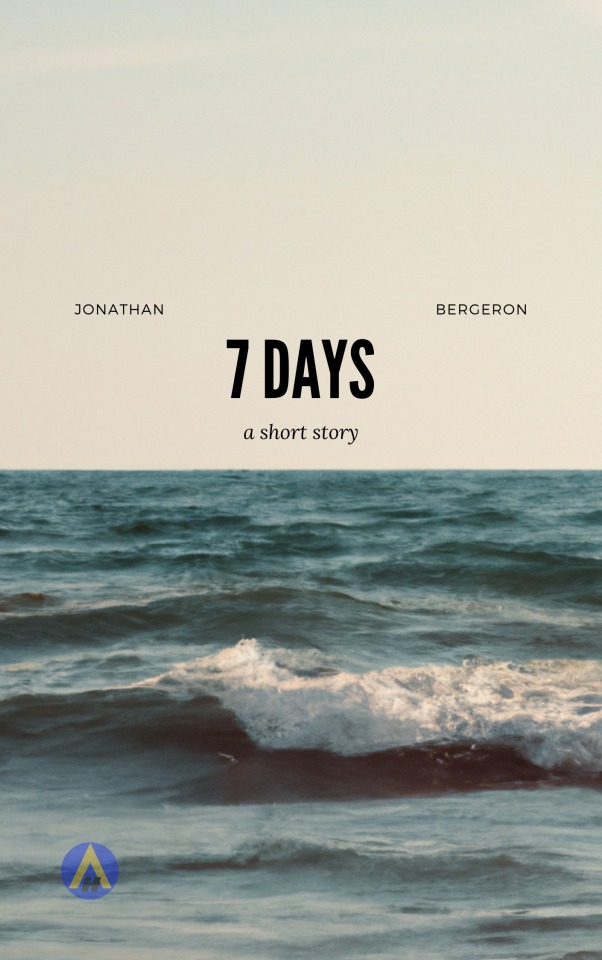
View On WordPress
#7 Days#Day 6#sci-fi#sci-fi book#sci-fi short story#science fiction#science fiction book#science fiction short story#scifi#scifi book#short story
0 notes
Text
Love is Inevitable
A "Humanity Fuck Yeah!" "Humans are Space Orcs" type of story, except that instead of an alien species admiring us for our ability to endure physical hardships, they admire us for our ability to endure grief.
Love is Inevitable
In the ages since contact had been made with the Earth and the human species, the other rational races of the Pan-Galactic Alliance had their various reasons for either abhorring or admiring them. A great many of the peoples admired Humanity for their general physical endurance – the ability to recover quickly from wounds and to withstand conditions that would kill a great many beings. However, the Mhrr’ah held them in awe for a very different kind of endurance.
First contact between the two species was a bit awkward because humans could not help but compare the Mhrr’ah to a certain kind of pet animal they kept. “Kitty!” - They resembled bipedal cats save for the small horns upon their heads, longer, boxier faces and notable biological differences such as reproduction through eggs. In turn, the Mhrr’ah compared humans to the golb, a small, bald, purplish-colored animal they kept as friends, although they were arguably more pig-like or doggish.
Their respective choice of pets, strangely, was what had started conversation which led to the Mhrr’ah thinking of humans as particularly tough.
The Mhrr’ah were rather appalled that humans kept companion animals that did not match their own lifespans. They were even more confounded by the ability of human beings to pick up and keep working and living after the loss of kin. The Mhrr’ah were highly emotional beings. As soon as they had grown, they tended to part ways with their parents, but stayed in touch with their clutch-mates. They formed attachments with mates and friends of similar health-status and age (and they did live long, by the human reckoning) so as to maximize the likelihood of a life together. Most forms of conflict on their planet were a distant memory of ancestral forms because of this peculiar type of empathy.
If one Mhrr’ah in a friend or family group died, the rest of their strong attachments was sure to follow. It was almost unheard of for one to lose a life-mate and not to have their own body shut down in pure despair within months of the event.
Conversations with humans brought up widows, those who had lost brothers, best friends, parents and animal companions time and again. Humans spoke to them of Stages of Grief and of the ways they’d sought out each other to support themselves through it. They spoke of ghost stories and mythical lands of the dead where some hoped to be reunited someday with those they’d loved. The Mhrr’ah, who did not understand how one could fall, but not the others in one’s chosen circle would bow their heads in salute to the resilient human explorers and tradesmen they’d met if they ever had a sad story.
And that is to say nothing of other tales the humans told them – the loss of homes, the loss of friends though things other than death, various mental breakdowns that they could recover from.
This, to them, was far more impressive than any physical endurance that humans ever had.
The Mhrr’ah were a people who were careful to keep to small circles and careful to keep themselves safe. They tried to distance themselves from forming friendships with humans even as they’d formed partnerships of mutual benefit simply because they knew that humans felt strong emotions, too, but were shorter lived than they were. A human might keep a Mhrr’ah in their memory if they’d loved and lost a friend, but a Mhrr’ah would not be capable of it for long. In the end, they’d even formed attachments with pets knowing that they would outlive them by many spans.
When asked, the humans said something that resonated with all Mhrr’ah. “We really can’t help it. Love is inevitable.”
#hfy#humans are space orcs#humans are weird#science fiction#short stories#short story#cat-people#humans are amazing#fiction
166 notes
·
View notes
Text
Greeting Death, with a Smile
Based on this post by u/lesbianwriterlover69 on Reddit
Sasha tasted blood. She was certain that she was shot at least once, it was the pain that hasn’t registered yet.
The squadron of alien invaders surrounded the poor woman. Sasha was just a small town farmer for a lunar colony turned militia member. She had no idea why the fakarians even bothered attacking a backwater town on a backwater colony. She had no idea why this race of rat-like xenos even attacked a human world in the first place. A show of power? A preemptive strike? Just for the fun of it? She didn’t know, nor care. But after all the raiding, the towns and villages burnt to the ground, and friends and family either killed or enslaved, Sasha knew what she would do to these bastards.
The closest soldier slammed their boot into her stomach, screaming something that vaguely sounded like eldiv. Fuckers couldn’t be bothered to translate the right language to insult her in. They stomped their foot again, blood flying out of Sasha’s mouth and tears rolling down her face as she search her pocket.
The kicking and insults provided a good enough distraction. She had managed to find the thing she was looking for, adrenaline and thankfulness that the alien wasn’t kicking her in the chest being the only things keeping her alive at this point.
The alien raised their foot to stomp again, but Sasha grabbed their foot, using the last of her strength to keep them close. The alien screamed at her in an unknown language as their comrades raised their guns, but everyone froze when they heard beeping.
One of the soldiers tracked the beeping, coming down to their human prisoner and removing her jacket. They discovered that strapped to Sasha’s chest was an improvised explosive.
The seconds felt like hours to Sasha. The alien in her grip barked orders as some of their men tried to pry him out of her death grip. Others readied their weapons, hoping to kill her before she detonated. The poor idiots didn’t know it wasn’t a detonator, but a dead man’ switch. Others made a break for it, hoping to escape the blast radius, comrades be damned.
Sasha’s mind raced. Everything and everyone she loved, everything and everyone she lost, flashed before her eyes. Her mom, dad, siblings, girlfriend, dog, coworkers, friends, neighbors, all gone. All dead. She was the unlucky one to survive the initial orbital bombardment. She was the unlucky one to survive the raids and the random bombings. The sniper attacks. The drone strikes. She survived entire towns being executed, and bombed into rubble. After all of that, Sasha was tired. She was alone. She had nothing to live for, except one thing. That’s why she was smiling. That’s why she willingly volunteered for this mission. The boot of Captain Shilis was in her hand. The man who personally killed the love of her life was mere seconds from death himself.
“Look into my eyes, fucker!” Sasha laughed in perfect fakari, echoing what Shilis said Zari a year ago to the day. “I want to see you die!”
Zari. Zari flashed across her mind. That cyan-scaled drac was one of the refugees who fled fakarian expansion, eventually finding a job at the same farm Sasha worked at. The coworkers quickly became friends, and after five years, the two were engaged. The wedding was planned for a nice sunny day. The anniversary of when the two first met. A year later, it’s the anniversary of Zari’s execution.
One last tear rolled down Sasha’s face as her grip loosened. It was enough for Shilis to break the grip, but it was too late to escape. Sasha will be with Zari again, watching and laughing at this bastard in hell.
231 notes
·
View notes
Text
Imagine you've grown up on a spacestation. It's a major port, several times larger then most terrestrial cities. You've gotten to meet people, from all around the known universe, cultures with diffrent gods, diffrent tongues, diffrent systems of government, even some that aren't even fully human anymore through genetic engineering and adaptation.
And for your entire life you've heard about planets. Most media, from the strangest fantasy stories, to the most mundane dramas, take place on planets and assume to viewer lived most of their life on a planet. And most of the you talk to are from planets too, even those that have made their home on the station still grew up on planets, or have family they visit on planets. But you don't really have any personal frame of reference for what a planet is even like. Once or twice you've been on a ship or visited a nearby station, but you've never actually been too a planet.
You don't think of things the way terrestrial people do. You don't think of things as being inside or outside, just in diffrent rooms. You don't think of places as being flat, but as having layers of floors. You don't even have a full idea of what being "outside" would be like.
And one day, long after you've become an adult, you actually visit a planet. Everyone you know kind of expects you to be in awe of the beauty of an open sky, to finally enjoy the feeling of fresh air. But to you, you feel nothing. It's chaotic and confusing, you don't know how to get anywhere, you can't navigate places this open. When you see an open field it scares you, like open space brought into a station's walls. Everything feels so big and crowded and so small and empty at the same time. You barely leave your hotel room the entire trip.
People are supposed to exist on the ground. But you adapted to something else. That's what humans do after all, adapt to things.
#my thougts#worldbuilding#my writing#writers#writeblr#my worldbuilding#writing#short fiction#speculative fiction#flash fiction#science fiction#fiction#my wriitng#my work#196#short story#original story#story#stories#space fantasy#space#spaceship#space station#spacestation#future#scif#scifi#science fantasy
787 notes
·
View notes
Text

#i have no mouth and i must scream#harlan ellison#science fiction#horror#the submitter didnt say if they meant the short story or the collection so both is fine#book poll#have you read this book poll#polls
73 notes
·
View notes
Text
Starseed Apples
“Here you go,” I said, putting down the last box. “Uncut fabric, plumbing supplies, and three cases with a fungus biohazard label. Do I even want to know what’s in those?” I cast a curious look at my fellow human as I handed over the signing pad. She was shorter and rounder than I was, dressed in a crisp uniform of a type I didn’t recognize. Big pockets everywhere.
She signed with a wry grin. “Those are dirt.”
“Dirt?” I repeated, looking around the admittedly spotless loading dock of this particular space station. “Dirt warrants a biohazard here?”
“Oh, you have no idea,” she said, handing the pad back. “Organic mulch that could contain anything from decomposed animals to fungus to poop? With uncountable amounts of bacterial life and potential germs? We’re lucky they only focused on the mold aspect!”
“Hm, good point,” I said.
Zhee, who was busy moving boxes off the hover sled, muttered something disparaging. I expected him to complain about how gross it all was, since he was always the first to point out when humans did something to offend his bug-alien sensibilities, but it sounded like he was griping about the strict station rules this time.
The human continued. “We have to keep a clean room between the greenhouse area and everything else. Even there, most things are in pots. We’ve got a great crop from Johnny Starseed right now!”
I’d heard that name before. “Oh, was he the one who sells little potted—”
“Apple trees, yeah,” she said. “Tiny and convenient, but they make an impressive number of apples as long as you feed ‘em quality dirt.” She bent down to pat a box.
Zhee finished freeing the sled. “Reasonable business plan,” he said, sounding almost complimentary.
“The guy named himself after Johnny Appleseed,” I told Zhee. “A human from centuries ago who got famous for traveling around and setting up apple orchards on Earth. Everybody likes a guy who brings food wherever he goes. And drink — I think some of those apples were supposed to be the cider variety.”
Zhee flicked his antennae. “Sounds like a very human thing to do,” he said drily.
“Have you tried the Starseed Reds?” the other human asked. “They’re very good.”
“No I haven’t, but I’d like to!” I said. “I’ve heard good things. I was kind of hoping to cross paths with him at some point. I wouldn’t mind a tiny apple tree in my quarters. Of course, the cat might get at it, and I’d probably have to find a grow lamp…”
She opened a boxy hip pocket, and pulled out the shiniest red apple I’d seen in a while. “Here you go.”
“Thank you!” I said, taking it eagerly. “That’s very generous!”
She waved it off. “Like I said, we’ve got a big crop. And I’ve got a different one that I’m saving for when I get off shift.” From another pocket, she produced a red apple with distinct orange stripes. “Which should be as soon as I get the supplies back to base.”
I laughed. “Is that the booze kind? I didn’t think those were real!”
“Oh yes,” she said with relish, putting it back in the pocket. “Starseed Cider Apples, no fermenting required!”
Zhee cocked his head, faceted eyes looking at both of us. “Poisonous apples?”
“Alcoholic apples,” I corrected, knowing full well that he considered that to be the same thing.
Zhee pushed the hover cart back toward the ship with a dramatic head tilt and antennae swirl. “Now that sounds like a human thing to do.”
“Well, you’re not wrong there,” I said with a smile. I thanked the other human and followed him, taking a bite of my non-alcoholic apple. It really was good.
~~~
The ongoing backstory adventures of the main character from this book. More to come!
#hm new posting interface#not a fan#SURELY there's a way to do this without having to add in the paragraph breaks manually#good thing today's story is a short one#annnnnyways...#my writing#the Token Human#humans are weird#haso#hfy#eiad#humans are space orcs#writeblr#science fiction#short stories
352 notes
·
View notes